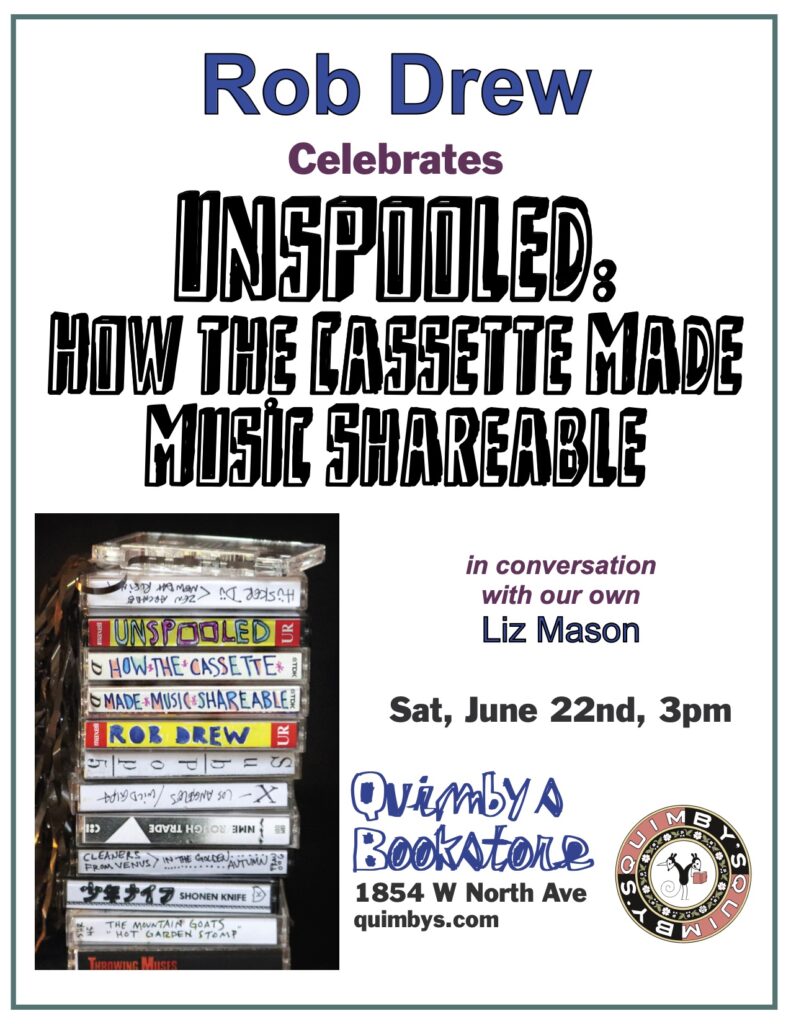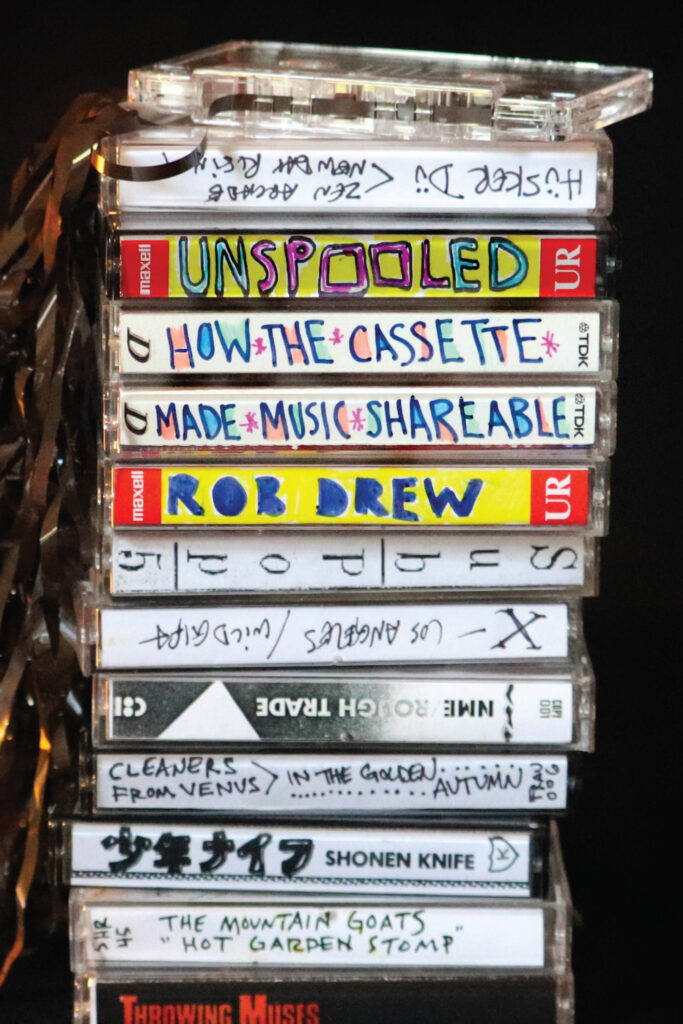| Jun ’24 |
| 22 |
| 3:00 pm |

Rob Drew Celebrates
Unspooled: How the Cassette Made Music Shareable,
In Conversation with Liz Mason
at Quimby’s Bookstore
1854 W. North Ave
Saturday, June 22nd, 3pm
Quimby’s welcomes Rob Drew to celebrate the release of his book Unspooled: How the Cassette Made Music Shareable on Saturday, June 22nd at 3pm, in conversation with Quimby’s manager Liz Mason.
Join us to hear Dr. Rob Drew trace the history of the cassette tape, a cheap, low-fidelity music medium that fans grew to love. Rob will discuss how cassettes upended the music industry, inspired independent musicians, and initiated rituals of music sharing through mix tapes.
Well into the new millennium, the analog cassette tape continues to claw its way back from obsolescence. New cassette labels emerge from hipster enclaves while the cassette’s likeness pops up on T-shirts, coffee mugs, belt buckles, and cell phone cases. In Unspooled, Rob Drew traces how a lowly, hissy format that began life in office dictation machines and cheap portable players came to be regarded as a token of intimate expression through music and a source of cultural capital. Drawing on sources ranging from obscure music zines to transcripts of Congressional hearings, Drew examines a moment in the early 1980s when music industry representatives argued that the cassette encouraged piracy. At the same time, 1980s indie rock culture used the cassette as a symbol to define itself as an outsider community. Indie’s love affair with the cassette culminated in the mixtape, which advanced indie’s image as a gift economy. By telling the cassette’s long and winding history, Drew demonstrates that sharing cassettes became an acceptable and meaningful mode of communication that initiated rituals of independent music recording, re-recording, and gifting.
“Offering a comprehensive history of the cassette from its origins in post-World War II taping technologies to the recent revival of the music cassette as a hipster artifact, Unspooled is the first book to give an extended account of the various ways that cassettes have transformed musical culture. This wonderfully engaging, clear, and witty book will appeal to a wide audience of music fans and critics interested in mixtapes, cassettes, and cassette culture and will become a classic in many fields.” -Will Straw, Professor of Urban Media Studies, McGill University
“Rob Drew is one of my favorite writers on music, and I wish more people knew about his work. This is the definitive cultural history of indie music’s tangled but fascinating love affair with the audiocassette.” -David Hesmondhalgh, author of Why Music Matters
“Any readers who have ever received or created a mixtape will appreciate this narrative. A solid blend of history and nostalgia about cassette tapes that’s perfect for Gen Xers.” -Tina Panik, Library Journal
“The story of the cassette tape Drew and Masters tell is compelling: how a lo-fi, accident- and deterioration-prone, and more-or-less parasitic audio technology not only achieved market dominance but captured a permanent place in the imaginations and practices of music-makers, labels, distributors, and fans the world over. Unspooled and High Bias show readers that the peculiar technology of the cassette tape exemplifies the inherent contradictions of popular music perhaps better than any other medium.” — David Pike, Popmatters
“Divided into six sharp chapters, Unspooled walks readers through the rich history of music nerds who used cassettes in ever-evolving ways. By following the chronology, Drew provides a detailed exploration of the cassette in terms of format, medium, and artifact.” — Adam P. Newton, Treble Zine (Read the full review here.)
Rob Drew is Professor of Communication at Saginaw Valley State University and author of Karaoke Nights: An Ethnographic Rhapsody. Follow him at @slobster48602
Liz Mason is the manager of Quimby’s Bookstore, a zine publisher, a mix tape aficionado and a karaoke enthusiast. Follow her at @caboosezine
Want the Facebook event invite for this? Here ya go!

Watch Rob on the “Cassette Books Mixtape” panel with Marc Masters (High Bias: The Distorted History of the Cassette Tape), Jerry Kranitz (Cassette Culture: Homemade Music and the Creative Spirit in the Pre-Internet Age), moderated by Tom McCourt.

